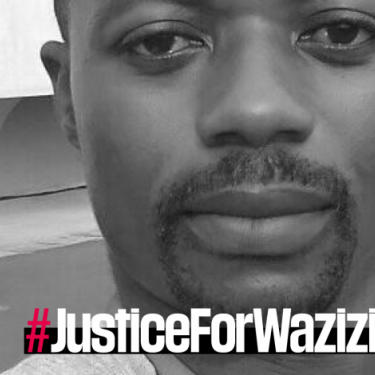Cameroon’s bogus account of journalist’s death is “obscene,” RSF says

Reporters Without Borders (RSF) condemns the bogus account of regional TV presenter Samuel Wazizi’s death that the Cameroonian authorities have provided after finally admitting he died while in military custody ten months ago, and calls for an impartial and independent investigation into the circumstances leading to his death.
The statement signed by the defence ministry’s press spokesman that was read out on the state radio and TV broadcaster CRTV yesterday fell far short of providing a credible explanation of how Wazizi came to die two weeks after his arrest in Buea, the capital of the English-speaking South-West Region, in August 2019.
According to this official version, Wazizi died in a military hospital in Cameroon’s capital, Yaoundé, on 17 August 2019, four days after being transferred there from Buea, and his death was the “result of a severe sepsis” not of “any act of torture.” The statement also claimed that his family was “in close contact” with him while he was in the hospital and was “informed” of this death.
This was categorically denied by one of Wazizi’s brothers, when reached by RSF. He said neither Wazizi’s lawyers nor any member of the family had any contact with him after soldiers removed him from Muea police station in Buea on 7 August 2019 and no member of the family was ever informed about his death. He also insisted that Wazizi was “in perfect health” at the moment of his arrest by the police on 2 August 2019.
RSF has seen several photos of Wazizi that were reportedly taken in Yaoundé on 13 August 2019. They show injuries to a foot, hand and shoulder suggesting that he had been tortured while in custody during the preceding days.
Ever since his arrest, Wazizi’s lawyers had constantly been requesting access to him and asking what charges were being brought against him. They were never told that he had died.
A presenter on Buea-based Chillen Media Television (CMTV), Wazizi was arrested in Buea on 2 August 2019 and was held at the police station in Muea, a suburb of Buea, until 7 August, when soldiers came and took him to the headquarters of the 21st Motorized Infantry Battalion in Buea.
RSF has established that Wazizi’s lawyer, was one of the last persons to see him alive. Wazizi told him his arrest was linked to comments he had made on the air criticizing the government’s handling of the unrest in Cameroon’s English-speaking regions. None of his lawyers and no member of his family was able to contact Wazizi after that meeting between him and Nkea in Muea police station.
“The explanations provided by the Cameroonian authorities are obscene and unacceptable,” said Arnaud Froger, the head of RSF’s Africa desk. “Samuel Wazizi’s family was never notified of his death. His brother’s emotion was unmistakable when RSF reached him by phone and he realized the information was now official. The circumstances of this journalist’s death deserve an impartial and independent inquiry that includes an autopsy. He was well at the time of his arrest. Given the many grey areas and the scant credibility of the belated explanations so far provided, only an additional and transparent investigation will establish the facts.”
Cameroon is ranked 134th out of 180 countries and territories in RSF's 2020 World Press Freedom Index, three places lower than in 2019.



